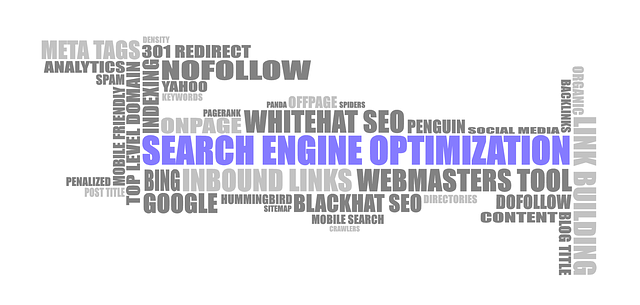Off-Page SEO, a critical digital marketing strategy, focuses on external factors influencing website rankings like backlinks and social media presence. Regular audits are essential to identify areas for improvement, capitalize on opportunities, and boost domain authority. Specialized tools like Ahrefs, SEMrush, BuzzSumo, and Hootsuite help analyze backlink profiles, social media engagement, and brand mentions. Common issues include low-quality backlinks, duplicate content, and lack of engagement, which negatively impact rankings. To improve Off-Page SEO, fix broken links, diversify backlink sources, create high-quality content, and promote it on social media to attract natural backlinks.
In today’s digital landscape, understanding Off-Page SEO is paramount for online visibility. This powerful strategy, distinct from on-page optimization, focuses on building authority and trust through external factors. By conducting regular Off-Page SEO audits, businesses can uncover critical insights into their digital footprint. This article guides you through the essentials, including key components, useful tools, common pitfalls, and effective strategies to enhance your site’s performance in search engine results pages.
Understanding Off-Page SEO: The Basics

Off-Page SEO refers to all activities and factors outside your website that impact its search rankings. It’s a crucial component in determining how visible your site is online, alongside On-Page SEO. Unlike On-Page optimization, which focuses on content within your site, Off-Page SEO deals with signals from external sources, primarily backlinks and social media presence.
Backlinks, or incoming links from other websites, are seen as votes of confidence by search engines. The more high-quality backlinks your site has, the more valuable it is in the eyes of Google. Social media interactions also play a role; active and engaged profiles can increase brand visibility and drive traffic to your site, indirectly influencing your Off-Page SEO performance. Understanding these concepts is fundamental for conducting an effective Off-Page SEO audit, aiming to identify areas for improvement and secure a stronger online presence.
Why Conduct Regular Off-Page SEO Audits?

Regular off-page SEO audits are essential for any business aiming to thrive online. These comprehensive assessments go beyond what’s on your website, evaluating the vast landscape of external factors that influence search engine rankings. By regularly scrutinizing backlinks, social media presence, brand mentions, and competitor strategies, businesses can identify areas of improvement and capitalize on opportunities.
Off-page SEO is like nurturing relationships in a network—it involves building quality connections with other websites, influencers, and online communities. A robust off-page strategy can drive relevant traffic, boost domain authority, and establish your brand as an authority in your industry. Conversely, neglectful audits may leave businesses vulnerable to penalties, missed opportunities for growth, and an ineffective digital presence.
Key Components of an Off-Page SEO Audit

An effective off-page SEO audit involves examining a website’s external links and online presence to enhance its search engine rankings. The key components include analyzing backlink profiles, assessing link quality, identifying toxic links, and evaluating social media engagement. By scrutinizing who is linking to the site, the nature of those links, and the overall authority of these external references, SEO professionals can uncover opportunities for improvement.
Additionally, this audit should consider online reputation management by monitoring brand mentions and user-generated content. Leveraging social signals, such as shares, likes, and comments, can further strengthen a website’s off-page SEO. This holistic approach ensures that the site’s digital footprint is optimized, allowing it to compete effectively in the ever-evolving online landscape.
Tools for Effective Off-Page SEO Analysis

Conducting a comprehensive off-page SEO audit requires a suite of specialized tools tailored to dissect various aspects beyond your website’s control. These include analyzing competitor backlinks, assessing domain authority, and evaluating site trustworthiness. Effective tools like Ahrefs, SEMrush, and Moz provide detailed insights into referring domains, backlink profiles, and the overall health of your online presence in relation to competitors.
Moreover, social media analytics platforms, such as BuzzSumo and Hootsuite, play a crucial role by uncovering high-performing content and influential advocates who can drive traffic and engagement. These tools democratize access to profound off-page SEO insights, enabling businesses to strategize effectively and stay competitive in the digital landscape.
Common Issues Found in Off-Page SEO Audits

When conducting an Off-Page SEO audit, several common issues often surface. One of the primary concerns is the quality and relevance of backlinks. Many websites struggle with having a high volume of low-quality or spammy links, which can negatively impact search rankings. These backlinks may come from untrustworthy sources, duplicate content, or sites that have little to no relation to the brand’s niche.
Additionally, content piracy is another significant problem. Plagiarized or stolen content results in penalties and reduces the overall authority of a website. Social media engagement is also crucial; a lack of active participation on relevant platforms can limit a site’s reach and impact. Moreover, broken links and 404 errors can hinder user experience and search engine crawling efficiency, indicating that these issues must be addressed to optimize Off-Page SEO performance.
Strategies to Improve Off-Page SEO Performance

To enhance Off-Page SEO performance, start by examining and addressing any broken or outdated backlinks. Regularly monitor your website’s backlink profile and disavow any low-quality or spammy links to maintain a clean and authoritative link ecosystem. Diversify your backlink sources by reaching out to influential websites in your industry for guest blogging opportunities, collaborations, or partnerships. This strategic approach ensures a mix of high-quality, relevant backlinks from diverse sources, which signals search engines about your website’s authority and trustworthiness.
Additionally, focus on creating engaging, shareable content that naturally attracts backlinks. Optimize your content for user engagement by incorporating social media sharing buttons, writing compelling meta titles and descriptions, and ensuring your content provides real value to readers. Leverage social media platforms to promote this content and engage with influencers, which can increase its visibility and the likelihood of it being shared and linked to by other websites.
